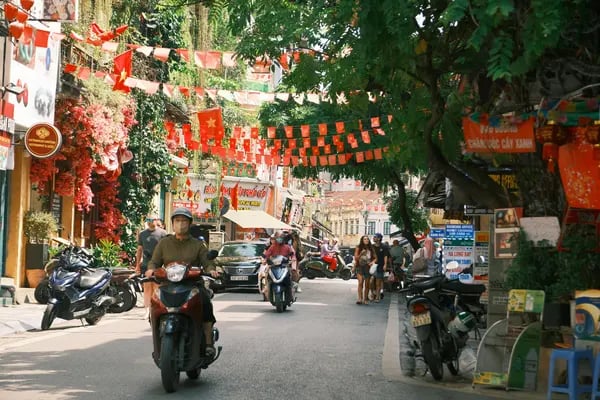Withdrawing Money in Vietnam in 2025: Best ATMs, Fees, Limits, Recommended Cards, and How to Open a Bank Account
Which ATMs Should You Use in Vietnam in 2025? Withdrawal limits, fees, exchange rates, and the best cards (Revolut, N26, etc.) to avoid unpleasant surprises.
BLOG VIETNAM
5/28/20254 min read


How to Withdraw Money and Open a Bank Account in Vietnam in 2025
Complete Guide for International Travelers
Managing your money abroad doesn’t have to be stressful. Whether you're staying in Vietnam for a few weeks or relocating long-term, understanding how to get cash, use your debit-card, and open a checking-account or savings-account with a financial institution can save you time, money, and hassle.
Withdrawing Money in Vietnam in 2025: What You Need to Know
Best ATMs to Use
Vietnam has a wide ATM network, but not all machines are equal. To avoid unnecessary bank charges or surcharge fees, use reputable banks like:
TPBank
VPBank
MB Bank
These banks typically offer local-currency (VND) withdrawals at lower fees and support a broad range of international debit-cards and ATM cards.
Withdrawal Limits & Tips
Most ATMs have a per-transaction limit of 10–15 million VND (~$400–$600 USD).
You may need to manually input the amount if it's above the preset options.
Choose to be charged in local-currency rather than foreign-currency to avoid dynamic foreign-exchange conversion fees.
Recommended Cards: Credit or Debit?
When traveling, credit and debit cards both have their pros and cons. However, Visa debit, prepaid, and platinum debit-cards linked to your checking-account often offer lower foreign transaction fees and are widely accepted by Vietnamese merchants.
Best International Cards for Vietnam:
Revolut – No foreign transaction fee, great online-banking features, and support for cash-back.
N26 – Easy foreign-currency transactions, low ATM fees, and intuitive app.
Wise – Ideal for transfer money and multi-currency use.
Charles Schwab (U.S.) – ATM fees waived globally and FDIC-insured.
Cards to Be Cautious With:
Cards from traditional credit-unions or banks with high cash advance fees.
Overdraft-linked debit-cards that incur penalties if the account balance drops below zero.
Cards issued by banks that don’t support international online-banking or don’t refund surcharges.
How to Open a Bank Account in Vietnam (2025)
Opening a checking-account or saving account in Vietnam is becoming easier for foreign cardholders, especially for those with long-term visas or work permits.
Required Documents:
Valid passport and visa
Proof of residence (rental agreement or hotel booking)
Application form from the issuer (bank)
Sometimes proof of income or local employment
Recommended Vietnamese Banks for Foreigners:
TPBank – Fast processing, English-speaking support, and online account access.
ACB (Asia Commercial Bank) – Great for depositing funds, managing your account balance, and setting up online-banking.
Sacombank – Reliable service, useful for those looking to open both a savings-account and a checking-account.
Foreign Currency Exchange Tips
Avoid exchanging money at airports or small kiosks.
Reputable financial institutions and gold shops offer better rates with lower foreign-exchange spreads.
Bring clean, unfolded USD bills, ideally $50 or $100 denominations. Torn or ink-marked bills may be rejected or deposited at reduced value.
Final Tips for Managing Your Money in Vietnam
Use a debit-card with low or waived ATM fees for daily transactions.
Set up online-banking with your card issuer to track your account balance and block your card in case of loss.
If you're investing, consider using a brokerage platform compatible with Vietnamese regulations.
Avoid cash advance transactions unless necessary—they often incur the highest bank charges.
💳 FAQ – Everything You Need to Know About Withdrawing Money in Vietnam (2025)
Can I use a debit card or ATM card in Vietnam?
Yes, most ATMs in Vietnam accept Visa debit, prepaid, and standard ATM cards from international banks. Make sure your card issuer has enabled international withdrawals and foreign-currency transactions.
What are typical bank charges for ATM withdrawals in Vietnam?
Fees range from $0 to $2.50 per withdrawal, plus possible foreign transaction fees. Premium cardholders may enjoy waived charges.
Should I choose local currency or foreign currency at the ATM?
Always select local currency (VND) to avoid Dynamic Currency Conversion (DCC) surcharges and poor exchange rates.
Can I open a checking or savings account in Vietnam as a foreigner?
Yes, with a valid visa, ID, and proof of address. Many banks offer English-language online banking for expats.
What’s the best way to get cash in Vietnam?
Use reputable bank ATMs such as TPBank, MB Bank, or ACB. Check for low withdrawal fees and see if your bank reimburses ATM charges.
Are cash advance options available? Should I use them?
Yes, but they have high interest and fees. A debit card linked to your account is usually better for regular withdrawals.
Can I access online banking with a Vietnamese bank?
Yes, most banks offer online portals for transfers, bill payments, and card security.
Do FDIC protections apply to Vietnamese bank accounts?
No. FDIC applies only to U.S. banks. Vietnam regulates its own banks, so keep larger savings abroad if you want extra protection.
Can I earn cash-back in Vietnam?
Rare with local banks, but some international cards offer cash-back for online and in-store purchases.
What should I do if my card is blocked or swallowed by an ATM?
Contact your bank immediately using the emergency hotline or mobile banking app.
Can I use a Visa debit card or Mastercard in Vietnam?
Yes, both are widely accepted at ATMs and major merchants.
What happens if my card is used for an unauthorized transaction?
Report it immediately. Visa and Mastercard offer fraud protection if claims are made promptly.
What’s the best way to manage your money in Vietnam without overdraft fees?
Use prepaid debit cards or no-fee checking accounts with mobile balance alerts.
Can I transfer funds or pay bills from Vietnam?
Yes, most banks and digital payment platforms support transfers and bill payments locally and internationally.
Can I use my credit cards for balance transfers abroad?
Sometimes — check with your provider for international balance transfer eligibility and interest rates.
What’s the safest way to deposit money into a Vietnamese bank?
Deposit cash at a teller or set up direct deposit through your employer.
Do prepaid debit cards work in Vietnam?
Yes, if issued by Visa or Mastercard. Features like bill pay may be limited.
Is there a way to waive the maintenance fee when banking abroad?
Maintain the required minimum balance or enroll in direct deposit to qualify.
What’s a digit-based PIN and how does it work in Vietnam?
It’s a 4–6 digit code for withdrawals and payments. Never share it and change it regularly.
Can I build credit history while living in Vietnam?
Not internationally, but responsible card use can help you access local credit lines in Vietnam.
Travel
Asia Blog – Practical tips about Vietnam, Thailand, South Korea, Cambodia... visas, eSIMs, banking, travel budget, and more.
© 2025. All rights reserved.
